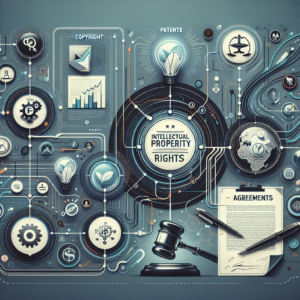Revolutionary New Copyright Laws: What You Need to Know Now!
[caption id="attachment_35116" align="alignnone" width="632"] Intellectual Property[/caption]
In a significant shift that could reshape the landscape of intellectual property, new copyright laws have been enacted, promising to address the complexities of digital content creation and distribution. As the digital age continues to evolve, these laws aim to provide clearer guidelines for creators, consumers, and businesses alike. This article delves into the essential aspects of the new copyright laws, highlighting key changes, implications for creators, and the future of copyright policy.
Understanding the Basics: An Overview of the New Copyright Laws
The newly implemented copyright laws represent a comprehensive overhaul of existing regulations, designed to adapt to the rapid advancements in technology and the increasing prevalence of digital content. At their core, these laws seek to balance the rights of creators with the needs of consumers and the public interest. The legislation introduces clearer definitions of copyrightable works, expands protections for digital content, and establishes more robust mechanisms for enforcement. By addressing the challenges posed by the internet and digital media, these laws aim to foster innovation while ensuring that creators are fairly compensated for their work.
Key Changes in Copyright Duration and Ownership Rights Explained
One of the most notable changes in the new copyright laws is the extension of copyright duration for certain types of works. While traditional copyright protection typically lasts for the life of the author plus 70 years, the new legislation introduces provisions that may extend this duration for specific categories, such as works created by corporations or collaborative projects. Additionally, the laws clarify ownership rights, particularly in cases of joint authorship and commissioned works. This clarity is crucial for creators who often navigate complex agreements and partnerships, ensuring that their rights are protected and that they receive appropriate credit and compensation for their contributions.
Implications for Creators: How the New Laws Affect Your Work
For creators, the new copyright laws bring both opportunities and challenges. On one hand, the extended duration of copyright protection provides a longer window for creators to monetize their works, potentially leading to increased revenue streams. On the other hand, the laws also impose stricter requirements for registration and documentation, which may create additional burdens for independent artists and small businesses. Creators must now be more vigilant in understanding their rights and responsibilities under the new framework, as failure to comply with registration requirements could jeopardize their ability to enforce their rights in the future.
Navigating Fair Use: What the Revisions Mean for Content Sharing
The concept of fair use remains a cornerstone of copyright law, allowing for limited use of copyrighted material without permission under certain circumstances. However, the new laws introduce revisions that clarify the boundaries of fair use, particularly in the context of digital content sharing. These changes aim to provide clearer guidelines for educators, researchers, and content creators who often rely on fair use to incorporate existing works into their own projects. While the revisions seek to protect the interests of copyright holders, they also emphasize the importance of transformative use and the public benefit of sharing knowledge, thereby fostering a more collaborative digital environment.
Enforcement and Compliance: Responsibilities Under the New Legislation
With the introduction of the new copyright laws comes an increased emphasis on enforcement and compliance. The legislation establishes more stringent penalties for copyright infringement, including higher fines and potential criminal charges for willful violations. Additionally, the laws empower copyright holders with enhanced tools for monitoring and enforcing their rights, such as automated takedown systems and streamlined processes for reporting infringements. Creators and businesses must now be proactive in ensuring compliance with the new regulations, as ignorance of the law will not be a valid defense against potential legal action.
Future Outlook: Potential Developments in Copyright Law and Policy
As the digital landscape continues to evolve, the new copyright laws are likely to undergo further revisions and adaptations. Policymakers and stakeholders are already discussing potential developments, including the need for international harmonization of copyright standards and the impact of emerging technologies such as artificial intelligence and blockchain on copyright protection. The ongoing dialogue surrounding copyright law will be crucial in addressing the challenges posed by new forms of content creation and distribution, ensuring that the rights of creators are upheld while fostering innovation and access to information in the digital age.
In conclusion, the revolutionary new copyright laws mark a pivotal moment in the realm of intellectual property, offering both challenges and opportunities for creators and consumers alike. As stakeholders navigate these changes, it is essential to stay informed and engaged with the evolving landscape of copyright law. By understanding the implications of these new regulations, creators can better protect their work and contribute to a more equitable and innovative digital environment. The future of copyright law will undoubtedly continue to evolve, and active participation in this discourse will be vital for all involved in the creative industries.
